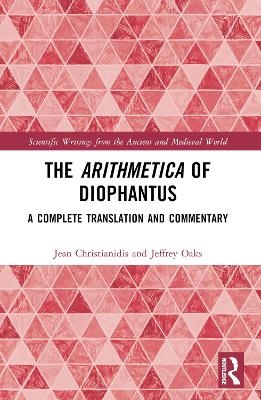
The Arithmetica of Diophantus
A Complete Translation and Commentary
Seiten
2024
Routledge (Verlag)
978-1-032-32445-6 (ISBN)
Routledge (Verlag)
978-1-032-32445-6 (ISBN)
This volume offers an English translation of all ten extant books of Diophantus' Arithmetica, alongside a comprehensive conceptual, historical, and mathematical commentary. Of interest to scholars of history from ancient Greece to the Renaissance, historians of mathematics, science, and technology, and mathematicians.
This volume offers an English translation of all ten extant books of Diophantus of Alexandria’s Arithmetica, along with a comprehensive conceptual, historical, and mathematical commentary.
Before his work became the inspiration for the emerging field of number theory in the seventeenth century, Diophantus (ca. 3rd c. CE) was known primarily as an algebraist. This volume explains how his method of solving arithmetical problems agrees both conceptually and procedurally with the premodern algebra later practiced in Arabic, Latin, and European vernaculars, and how this algebra differs radically from the modern algebra initiated by François Viète and René Descartes. It also discusses other surviving traces of ancient Greek algebra and follows the influence of the Arithmetica in medieval Islam, Byzantium, and the European Renaissance down to the 1621 publication of Claude-Gaspard Bachet’s edition. After the English translation the book provides a problem-by-problem commentary explaining the solutions in a manner compatible with Diophantus’s mode of thought.
The Arithmetica of Diophantus provides an invaluable resource for historians of mathematics, science, and technology, as well as those studying ancient Greek, medieval Islamic and Byzantine, and Renaissance history. In addition, the volume is also suitable for mathematicians and mathematics educators.
This volume offers an English translation of all ten extant books of Diophantus of Alexandria’s Arithmetica, along with a comprehensive conceptual, historical, and mathematical commentary.
Before his work became the inspiration for the emerging field of number theory in the seventeenth century, Diophantus (ca. 3rd c. CE) was known primarily as an algebraist. This volume explains how his method of solving arithmetical problems agrees both conceptually and procedurally with the premodern algebra later practiced in Arabic, Latin, and European vernaculars, and how this algebra differs radically from the modern algebra initiated by François Viète and René Descartes. It also discusses other surviving traces of ancient Greek algebra and follows the influence of the Arithmetica in medieval Islam, Byzantium, and the European Renaissance down to the 1621 publication of Claude-Gaspard Bachet’s edition. After the English translation the book provides a problem-by-problem commentary explaining the solutions in a manner compatible with Diophantus’s mode of thought.
The Arithmetica of Diophantus provides an invaluable resource for historians of mathematics, science, and technology, as well as those studying ancient Greek, medieval Islamic and Byzantine, and Renaissance history. In addition, the volume is also suitable for mathematicians and mathematics educators.
Jean Christianidis is a professor of history of mathematics at the National and Kapodistrian University of Athens (Greece) and partner member of the Centre Alexandre-Koyré (Paris, France). He has authored or co-authored numerous articles on Diophantus and on Greek and Byzantine mathematics. Jeffrey Oaks is a mathematics professor at University of Indianapolis (USA). He is co-author of the 2021 book Al-Hawārī’s Essential Commentary: Arabic Arithmetic in the Fourteenth Century.
Part I: Introduction, 1. Diophantus and his work, 2. Numbers, problem solving, and algebra, 3. History, 4. Structure and language of the Arithmetica, 5. The didactic aspect of the Arithmetica, Part II: Translation, Part III: Commentary, Part IV: Appendices.
| Erscheinungsdatum | 08.11.2022 |
|---|---|
| Reihe/Serie | Scientific Writings from the Ancient and Medieval World |
| Zusatzinfo | 22 Tables, black and white; 5 Line drawings, black and white; 11 Halftones, black and white; 16 Illustrations, black and white |
| Verlagsort | London |
| Sprache | englisch |
| Maße | 156 x 234 mm |
| Gewicht | 1642 g |
| Themenwelt | Geschichte ► Allgemeine Geschichte ► Vor- und Frühgeschichte |
| Mathematik / Informatik ► Mathematik | |
| ISBN-10 | 1-032-32445-7 / 1032324457 |
| ISBN-13 | 978-1-032-32445-6 / 9781032324456 |
| Zustand | Neuware |
| Informationen gemäß Produktsicherheitsverordnung (GPSR) | |
| Haben Sie eine Frage zum Produkt? |
Mehr entdecken
aus dem Bereich
aus dem Bereich
Was Pompeji über uns erzählt
Buch | Hardcover (2023)
Propyläen (Verlag)
CHF 44,75
auf den Spuren der frühen Zivilisationen
Buch | Hardcover (2023)
C.H.Beck (Verlag)
CHF 27,95


